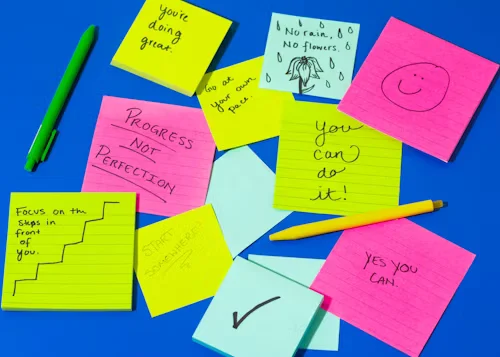How to Overcome Procrastination and Boost Your Productivity
Procrastination can feel like an endless cycle, holding you back from achieving your goals and reaching your potential. Whether it’s avoiding a big work project, delaying a task you don’t enjoy, or simply feeling stuck, procrastination can lead to unnecessary stress and missed opportunities. But here’s the good news: You don’t have to let procrastination control your life. With a few simple and proven strategies, you can break free from this habit and skyrocket your productivity.
In this article, we’ll share actionable tips that will help you overcome procrastination and boost your productivity, allowing you to get more done in less time.
Why We Procrastinate: Understanding the Root Causes
To effectively tackle procrastination, it’s crucial to understand why we do it in the first place. Procrastination isn’t about being lazy. It often stems from a variety of emotional or psychological reasons, such as:
- Fear of failure: The fear of not doing something perfectly can keep us from even starting.
- Perfectionism: Waiting for the “perfect” time or ideal conditions often leads to putting things off.
- Overwhelm: Facing a big task can cause anxiety, making us want to avoid it altogether.
- Instant gratification: The pull of immediate rewards, like checking social media, often outweighs the long-term benefits of completing tasks.
Once you identify the reason for your procrastination, you can implement strategies that directly address these underlying causes, helping you take action with greater ease.
Set Clear and Achievable Goals
A major reason many people procrastinate is that their goals are unclear or too vague. Without a clear understanding of what needs to be done, it’s easy to push tasks aside. To avoid this, break larger tasks into smaller, manageable steps. By focusing on one small task at a time, you will feel less overwhelmed and more motivated to continue making progress.
How to Set SMART Goals
A useful way to set clear, achievable goals is to use the SMART framework. SMART goals are:
- Specific: Define the exact task or outcome you want to achieve.
- Measurable: Determine how you will track your progress.
- Achievable: Set a realistic goal that’s possible to accomplish within the available time and resources.
- Relevant: Choose goals that matter to you and align with your broader objectives.
- Time-bound: Set a specific deadline to help keep you accountable.
For example, rather than saying, “I need to work on my report,” you can set a SMART goal like, “I will write the introduction for my report by 2 PM today.” This approach makes the task clearer and less daunting, helping you get started.
Create a Structured Daily Routine
A well-organized routine can help prevent procrastination and ensure that you stay productive throughout the day. When you have a set schedule, you know exactly when to start and finish tasks, reducing the chances of getting sidetracked. Here’s how you can structure your day:
Time Blocking for Productivity
Time blocking involves dividing your day into specific blocks of time for different tasks. By allocating time for both work and breaks, you can manage your energy and stay focused. For example:
- 8:00 AM – 9:00 AM: Review emails and plan your tasks for the day
- 9:00 AM – 11:00 AM: Focused work on high-priority tasks
- 11:00 AM – 12:00 PM: Take a short break and stretch
- 12:00 PM – 1:00 PM: Lunch break
- 1:00 PM – 3:00 PM: Continue working on projects
- 3:00 PM – 4:00 PM: Review the day’s work and plan for tomorrow
Having a plan for each part of the day helps you stay on track and avoid distractions.

Break Tasks Into Smaller Steps
Sometimes, procrastination arises because a task feels too big or overwhelming. Instead of tackling the entire project at once, break it down into smaller, more manageable tasks. This makes the work seem less intimidating and gives you a clear path forward.
For instance, if you need to write a report, don’t think about the entire document. Start with an outline, then work on one section at a time. By completing small tasks one after another, you’ll gain momentum and feel more accomplished.
Use the Two-Minute Rule
The Two-Minute Rule is a simple productivity strategy that helps eliminate procrastination for small tasks. The idea is straightforward: If a task will take two minutes or less, do it immediately. Whether it’s responding to an email, making a quick phone call, or tidying up your workspace, handling these small tasks right away prevents them from piling up and becoming overwhelming.
By consistently completing quick tasks, you can build momentum that carries you through the rest of your day, making larger tasks feel less intimidating.
Minimize Distractions and Stay Focused
In today’s digital world, distractions are one of the main contributors to procrastination. Constant notifications, social media, and even cluttered workspaces can derail your focus and lead to wasted time. To boost productivity, take steps to eliminate distractions:
Practical Tips to Reduce Distractions
- Turn off notifications: Mute your phone and computer notifications to avoid interruptions.
- Create a dedicated workspace: Set up a space that’s free from distractions where you can focus solely on your work.
- Use website blockers: Tools like Freedom or StayFocusd can help you block distracting websites during work hours.
- Set designated break times: Instead of allowing yourself to take breaks whenever you feel like it, plan specific times during the day to recharge.
By minimizing distractions, you’ll be able to focus on the task at hand, making it easier to get things done.
Reward Yourself for Progress
To make productivity more enjoyable and to maintain motivation, create a system of rewards. After completing a task or reaching a milestone, treat yourself to something small that brings you joy—whether it’s taking a break, having a snack, or watching a short video.
Rewarding yourself for progress not only reinforces positive behavior but also helps you stay motivated to keep pushing forward. It turns the task into something you look forward to rather than something to dread.
Get an Accountability Partner
Accountability is a powerful tool in overcoming procrastination. When you have someone to check in with, it adds a layer of motivation and responsibility. Whether it’s a coworker, friend, or family member, sharing your goals with someone else can help you stay focused and committed to your tasks.
Schedule regular check-ins to discuss your progress and share your challenges. This external accountability can help you push through moments of procrastination and stay productive.
Practice Self-Compassion
Lastly, it’s important to be kind to yourself as you work to overcome procrastination. Everyone slips up from time to time, and it’s easy to get discouraged when things don’t go according to plan. However, self-compassion can help you stay motivated. Instead of criticizing yourself when you procrastinate, acknowledge that it’s normal and refocus your efforts.
Treat yourself with the same understanding and encouragement you would offer to a friend. This mindset shift will help you stay positive and keep progressing toward your goals.
Conclusion
Procrastination doesn’t have to hold you back. By setting clear goals, creating a structured routine, breaking tasks into manageable steps, and eliminating distractions, you can take control of your productivity and stop procrastinating for good. Start small, stay consistent, and be patient with yourself as you develop new habits. Over time, you’ll find that staying productive becomes easier, and procrastination no longer has the power to derail your success.


